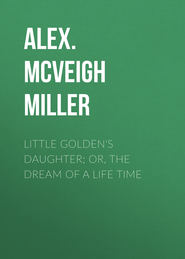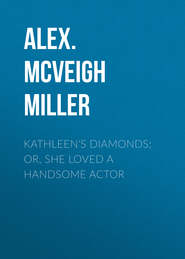По всем вопросам обращайтесь на: info@litportal.ru
(©) 2003-2024.
✖
Pretty Geraldine, the New York Salesgirl; or, Wedded to Her Choice
Настройки чтения
Размер шрифта
Высота строк
Поля
"Yes, I say him hugging her on the bridge, myself," said the old countryman who had passed them, and a smile went around, and then a cheer for the fair young life saved for a happy wedded future.
They carried her to the hotel that was but a few yards away, and it was found that she had sustained some bruises on her side, that was all. She would be able to go on with the company.
And a great revulsion of feeling took place in her mind—joy that her life was spared, horror at the momentary insanity that had driven her to that awful deed. Life grew sweet again, in spite of her great sorrow.
When the sympathetic women left her alone that evening in her room, she knelt down in a passion of repentance, and prayed God to forgive her for her great sin in trying to throw away the life He had given.
And she prayed Heaven to help her to forget Harry Hawthorne, and to love Clifford Standish, the man she had promised to marry.
"Surely he is good and true, and deserves my love," she thought, in an impulse of gratitude to him for the way he had shielded her when the people talked of suicide. She was ashamed of the truth now—glad for them to think it had been an accident.
"I will never be so foolish and so wicked again," she thought, in her keen remorse for her sin.
She spent a wakeful, restless night in spite of the sedatives the kind Doctor Spicer had administered before he went away. The hotel was so close to the railroad that she could hear the trains thundering by all night long, and the sound made her shudder with terror at thought of the heavy iron wheels that had come so near to crushing out her fair young life.
She was glad when morning came, and they boarded the train for New York.
She was eager to get away from this place, yet she would never forget Alderson, with its beautiful mountains, its romantic, winding river, and the bridge where she had stood with Standish, listening to the cruel words that had extinguished the last spark of hope in her breast and driven her mad with despair.
No, she would never forget beautiful Alderson, on the rippling, winding, singing Greenbrier River, set like an emerald chain between its romantic banks, overshadowed by wooded mountains, but she would remember it always with a horror it did not deserve, poor Geraldine, because of its tragic associations.
CHAPTER XVI.
"CALL PRIDE TO YOUR AID, GERALDINE."
"It is a common fate—a woman's lot—
To waste on one the riches of her soul,
Who takes the wealth she gives him, but cannot
Repay the interest, and much less the whole.
"'Tis a sad gift, that much applauded thing,
A constant heart; for fact doth daily prove
That constancy finds oft a cruel sting,
While fickle natures win the deeper love."
We must return to our description of the scene in the theatre when the curtain rose on the first act, and the eager eyes of the large audience turned upon the stage.
The heroine of the play, Laurel Vane, a beautiful girl, left penniless and alone by the death of her only surviving parent, was discovered weeping in the shabby room from which she would soon be turned out, because she had no money to pay her rent.
Enter the handsome villain, Ross Powell, who declares his love for Laurel, and makes wicked proposals.
Repulsed with scorn, he departs, vowing vengeance on the scornful little beauty.
Desperate with misery, Laurel seeks a beautiful young lady, the noble daughter of a publisher, for whose magazine her father had written until his death.
"She is a sister-woman, and will help me in my trouble," thought the poor girl.
Between this splendid Miss Gordon and her clever maid, a plan was formed by which the orphan girl (by sailing under false colors) became the honored guest of wealthy people, and afterward the bride of a proud aristocrat, who thought he had married the peerless Miss Gordon, and had never heard of poor little Laurel Vane, who was his worshiped wife.
Upon this conspiracy hung all the plot of the play, and the leading parts were taken, first by Clifford Standish, leading man, the part of the hero, St. Leon Le Roy; the part of the heroine, Laurel Vane, by Geraldine Harding; the villain, Ross Powell, by Cameron Clemens; and Miss Gordon by Madeline Mills, the usual star of the company, although she had yielded precedence in this case to Geraldine, who looked so exactly the part of the ingenue heroine, with her starry brown eyes and curly golden hair.
But it is not necessary to our story to go into the details of the play. Although it enthralled the attention of the sympathetic audience, it held even greater interest for the party in the Stansbury box, because they knew two of the actors so well.
How it thrilled Harry Hawthorne to see pretty Geraldine again, even though he deprecated her stage career so bitterly.
As for Cissy, the tears sprang to her eyes when she first saw her lost friend, looking so familiar in the same simple black serge gown she had worn behind the counter when she was only a salesgirl at O'Neill's great store, and which answered excellently well for the mourning gown of the orphan heroine. Indeed, that floating mass of golden locks was glory enough to lend beauty to the shabbiest attire.
They watched her with absorbing interest through the changes of the play, but for a long time Geraldine did not perceive them. She was absorbed in her work, and did not cast coquettish glances at the boxes, like the other actresses. It was well she did not, for the sight of them would have unnerved her cruelly.
But Clifford Standish was on the alert, and while posing as the magnificent Le Roy, scowled secretly at the occupants of that particular box.
When the first act was over, he intercepted Geraldine on her way to the dressing-room, and said:
"I have something very particular to tell you.
"Yes."
"Now call your pride to your aid, dear one, for you will be shocked, I know. But I thought it best to put you on your guard."
"Yes," she answered, paling suddenly, but with her small head proudly erect.
"Have you noticed the first box to the right?"
"No, I have not looked at the house at all. I heard it was crowded," wearily.
"It is, and we have made a hit. But—that box—there's a theatre party in it—all people that you know."
"Indeed," listlessly, pretending no interest.
"Yes, and I tell you about them now so you will not notice them when you go on again in the second part. They are the Stansburys; the bride and groom, Harry and Mrs. Hawthorne; the two single Odell girls, and Cissy Carroll, with three young men—their beaus, no doubt."
She clutched his arm with a trembling hand.
"I—I—wish you had not told me," she faltered. "I—shall—be nervous now—in my part, I fear."
"You do not mean that you can care for that fellow still—you, my promised bride, and he the husband of Daisy Odell?" reproachfully.
"Oh, no, no; do not accuse me of such weakness," wildly. "But there is—Cissy, you know—Cissy turned against me, and we were so fond once!"
Her voice was almost a wail.
"Do not think of her, my dearest love—she is not worthy of it, the jealous, envious creature! Call pride to help you appear indifferent. Do not even turn your head toward that box, and they need never know how they have wounded your fond heart," he persisted, anxiously.
"Yes, yes; I will obey you," she answered, faintly.
"And, Geraldine, my darling—my sweet, promised bride—you know how madly I love you, but you have denied all my prayers for an immediate marriage! Will you not relent and make me the happiest man on earth? Oh, let us be married to-night after the play! It can be managed easily enough. Say yes, dearest?"
A call-boy came through the corridor, chanting:











